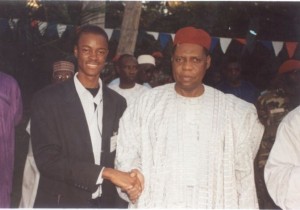
The football world was shocked on January 8 when Angolan rebels opened fire on a bus carrying Togo football officials in the oil-rich province of Cabinda leaving the bus driver, Togo’s assistant coach and press officer dead. Several other players injured. The team was crossing the border from the Democratic Republic of Congo into Angola ahead of the African Nations Cup kickoff.
The Hawks of Togo were in high spirits ahead of the continent’s premier sporting extravaganza which kicked off on January 10 with a 4-4 draw between the host nation and Mali. But was the shooting incident just an accident?
Issa Hayatou, president of the Confederation of African Football (CAF) was left “felling terribly bad and short of words” and expressed his sympathy to Togo following the attack. Togo withdrew from the tournament as a result of the attack.
“We are in a deep shock following the tragic incident that happened to our Togolese brothers and friends,” Hayatou said on CAF’s official website.
“You came here to play football but unfortunately two of your brothers were killed.
“I am feeling terribly bad and short of words.
“It is left to you to decide to stay in a competition synonym of fraternity, brotherhood, friendship and solidarity.
“And in case you decide to leave the competition, we will definitely understand your decision and it will be accepted.
“It is a difficult choice, individual choice and also collective choice; you are the only one who can decide.”
However, there are more concerns as a faction of the separatist group on Sunday threatened a new wave of attacks saying they had warned against hosting the Nations Cup in their province.
The Forces for the Liberation of the State of Cabinda-Military Position (FLEC-PM) claim responsibility for the attack and said they would continue their attacks because Hayatou had refused to move games scheduled in the northern enclave of Cabinda.
“This is going to continue, because the nation is at war, because Hayatou persists,” the group’s secretary general, Rodrigues Mingas, who lives in exile in France, told AFP by telephone.
“Weapons will continue to talk,” he said. “This is our home, and it’s time Angola understood that.”
“We wrote two months before the Nations Cup to Mr. Issa Hayatou to warn him that we were at war. He did not want to take our warnings into consideration. They were warned, they knew it, and they closed their eyes.”
“If they (Angola’s government) wanted to hold the Nations Cup in Cabinda, it’s because they had a hidden marketing agenda to make people believe that there’s peace in Cabinda so that investors would invest in Cabinda,” he said.
“There was a counter-attack, that’s when we really erupted (with gunfire),” Mingas said, adding the gun battle lasted about 20 minutes.
“We didn’t specifically target the Togolese. It could have been Angola, Ivory Coast, Ghana… Anything is possible. We are at war, and it’s no holds barred.
“We always regret the death of human beings but there are also thousands of Cabindans killed over 35 years,” he said.
The province which now produces 60 percent of the oil was scheduled to host Group B matches featuring Ghana, Burkina Faso, Ivory Coast and Togo.
If Mingas’ claims are true, should this not have raised earlir concerns for rescheduling the games somewhere else? There might be questions raised as to where else within the given time frame but if we are to judge by the new threats, then we can as well argue that the significance and security of the tournament is under jeopardy.
Other players, despite the assurance that the situation is under control, might be very concerned about insecurity, which might also affect their performance on the pitch.
Who is to be blamed, the Angolan government, CAF, or both? Is it a communication lapse?
CAF usually has its inspectors frequent host nations ahead of a major tournament. Were they not made to be aware about imminent security threats? If that happened, what action(s) did they take?
It is such a shame that such incident could happen at the major sporting event which is seen as a tool to foster peace and development. The sport is seen as an ember of hope to millions of Africans but the authorities need to say more on what went wrong to prevent future instances from reoccurring.
Also see:
· Exclusive: MLS Regional Ambassador Dante Washington Believes The U.S. Will Defy The Odds In South Africa
· Exclusive Interview: The U.S. Qualifying For The World Cup Is Not Even A Question, Says Alexi Lalas
· Exclusive Interview: Former England Ntl. Team Psychologist Bill Beswick Tips England To Win World Cup
· CAF Unveil Five-man Shortlist For 2009 African Player Of The year
· Exclusive Interview: Obi Mikel Eyes Champions League and Premiership
· Exclusive Interview: Salomon Kalou Anticipates A Great Season
> Click Here to return to IB’s Blog Home Page
> Click Here to return to Ibdabo.com Home Page
